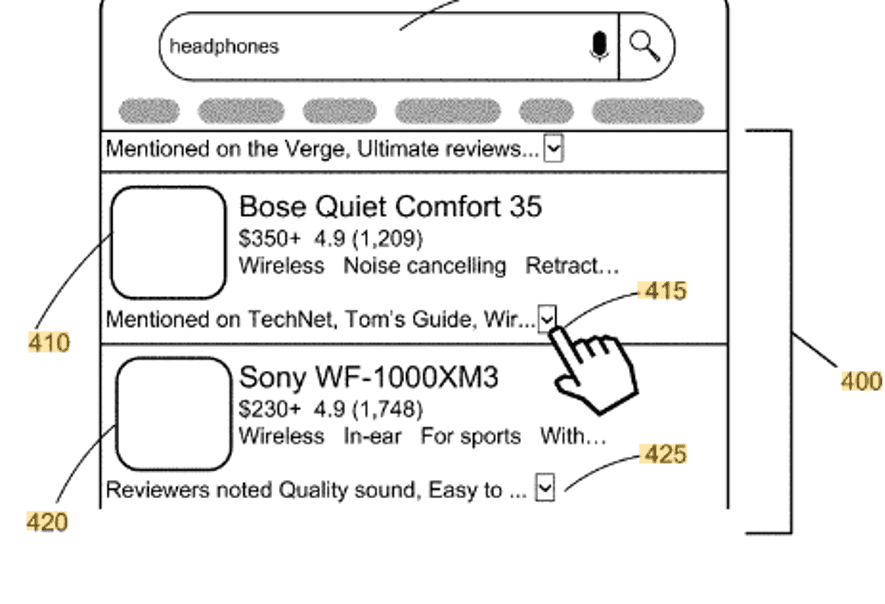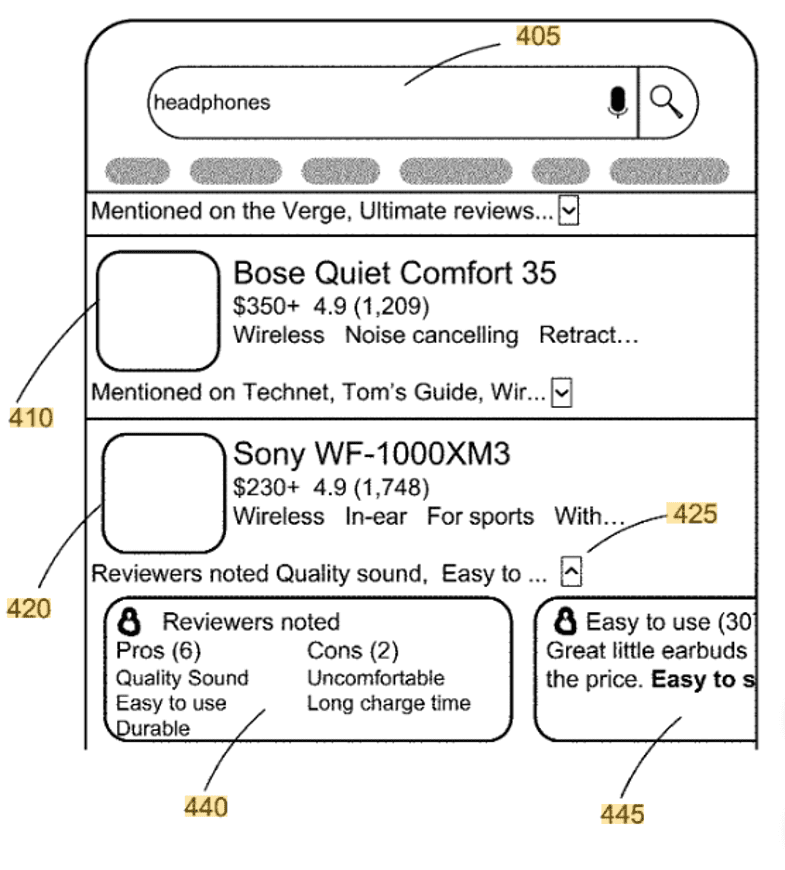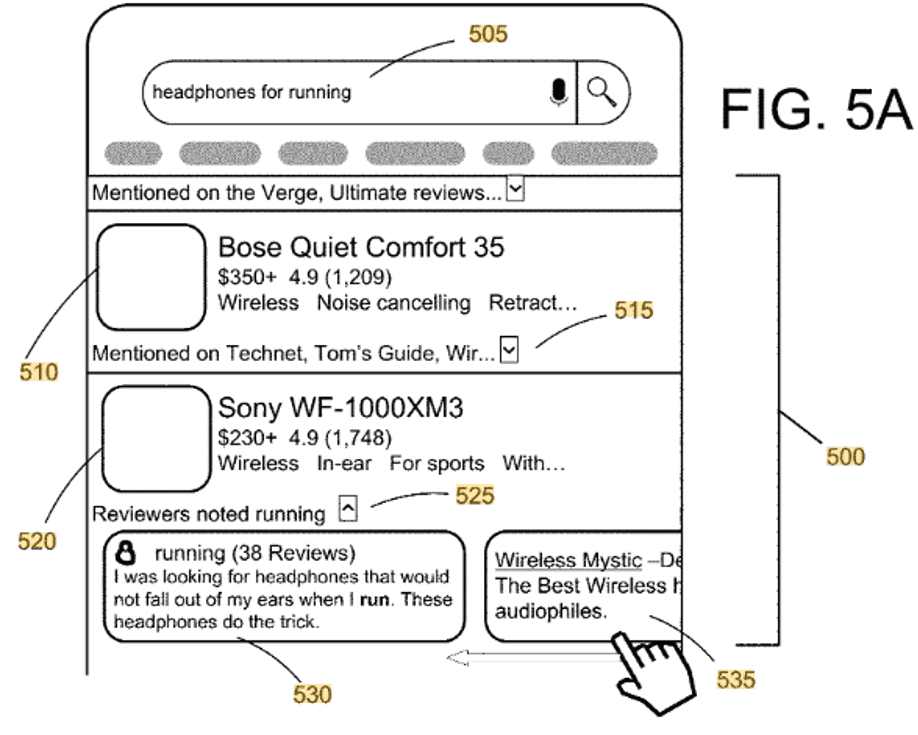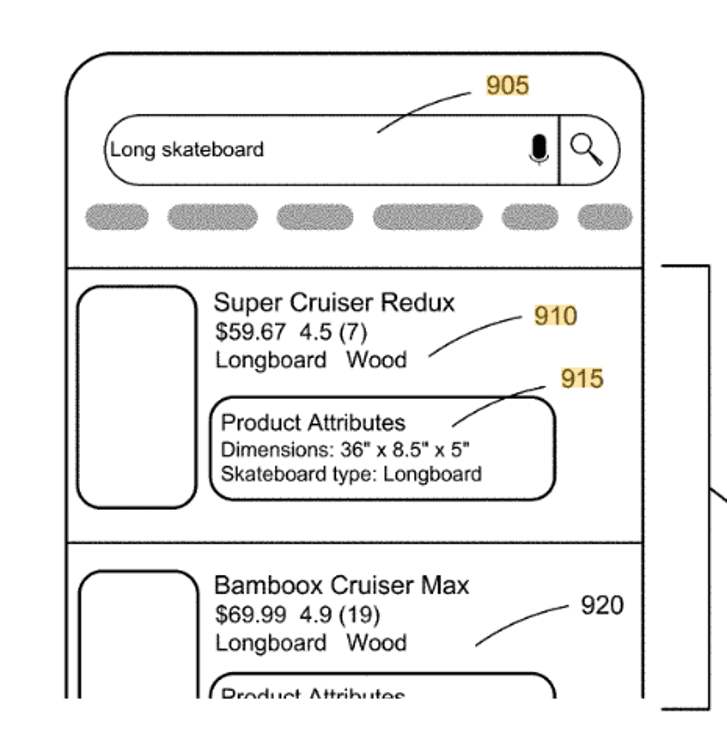
Specific examples showing where annotation information can be pulled from!
Query: “Headphones”
In this case, the annotations displayed in the SERPS include “mentioned on…” and notes from people who have reviewed the product.


What can we learn from this? Getting your product mentioned in authoritative places could possibly help you earn these annotations and improve user trust. Sounds like E-A-T, right? Also, encouraging users to leave descriptive reviews of your product, including their thoughts on pros and cons could prove valuable.
Query: “Headphones for running”

In this example, Google is able to extract information from reviews from users who specifically mention using headphones for running. The patent tells us that if they can extract information specific to running with headphones then this may actually result in higher rankings.
“In the example of FIG. 5A, the annotation includes a snippet of a user review that mentions running in conjunction with headphones. That users mention running in reviews for a product may result in a higher ranking for the particular product.”
They tell us that showing this in the SERPS could result in fewer follow-on queries from the searcher because the “user has a level of confidence that the result matches the intent.”
Again, encourage your customers to leave detailed reviews explaining how they use your products! It may also be helpful to give your reviewers specific details on what you’d like them to cover.
Knowing what details are important to a searcher who is interested in this product is important. One of Google’s recommendations for writing good product reviews is:
“Do your reviews Identify key decision-making factors for the product’s category and how the product performs in those areas? For example, a car review might determine that fuel economy, safety, and handling are key decision-making factors and rate performance in those areas.”
We think it may also be helpful to look at which annotations are appearing across many competitors for your search queries. We know that when Google uses structured data something that is important is corroborating information across several sources. The same may be true for unstructured data that is extracted from pages. For the Larceny bourbon example shared earlier, we found that many of the pages that had annotations included that there was a “reasonable price point”. We think it is a good idea to look at which annotations Google pulls from other pages, and if it makes sense, include this information on your pages as well. It likely is also helpful to look at user generated content on this topic on sites like Reddit and Quora to see whether there is a recurring theme in the attributes that are discussed for your product.
Query: iPhone 10 and Newest iPhone
In this example, the annotation given is to show that there is a newer version available. They call this a “version change annotation type”:

This reminds me of Google’s recommendation on product reviews which says, “Do your reviews describe how a product has evolved from previous ****** or releases to provide improvements, address issues, or otherwise help users in making a purchase decision?” Giving your searchers the most up to **** information possible is likely important in Google’s eyes.
You may also trigger annotations for product searches if your product has been mentioned in authoritative “top 10” lists. This troubles me a little as I have heard reports of companies paying for placement in lists like this. Hopefully the most reputable of these lists are trustworthy and not unduly influenced by payment for placement.

Some annotations may include video snippets which are called “media annotations” in the patent.

“A media annotation may refer to a video explaining, rating, or otherwise relating to the item. In some implementations a media annotation may be associated with curated sources, e.g., a company that sells an item or a news organization.”
Producing rich media content to discuss your products could be helpful for many reasons.
Query: Long skateboard
In this case, several product attributes such as dimensions are shown in the annotation:

“A query context annotation type may use a query term related to measure and emphasize the product attributes that meet those terms.” Google is able to identify that a searcher who looks for “long” skateboards would find this annotation useful.
One of Google’s recommendations for writing good product reviews is to “provide quantitative measurements about how a product measures up in various categories of performance?”
This is where first-hand expertise on a product comes in handy. If you know your products well, you know what searchers are looking for. Rather than simply regurgitating what everyone else says about a product, you may be able to identify what other aspects are important to searchers. You might also be able to glean some information from GSC query data here. Look for queries where searchers are looking for information on specific aspects and attributes of your products and ensure that you’ve answered their questions in your copy or in user reviews on your page.



